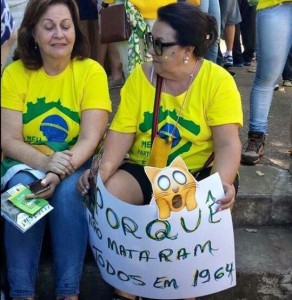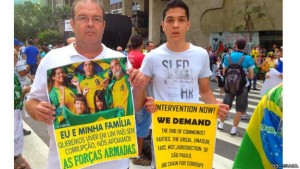THERE IS ONE THING readers looking for a fair and balanced view of Brazil’s Sunday protests against President Dilma Rousseff won’t find easily in press reports.
And it is how openly right-wing, and how openly sanguine, many of the demonstrators were.

Having tens or perhaps hundreds of thousands of people demonstrating across the country against a sitting president is surely a vigorous display of democracy. But is that all?
Only some international reports have actually touched, and even then rather lightly, on the issue of intolerance in these protests – this New York Times story, for example.
But a lot of it simply doesn’t make for fair and balanced material. Here and here are some examples (in Portuguese).
“Dilma, it’s a shame they didn’t hang you in the DOI-Codi,” said one sign, referring to the infamous jails where thousands of political prisoners were tortured, including Ms Rousseff, and many to death, during Brazil’s military dictatorship (1964-1985).
“Why didn’t they kill everyone in 1964?,” wondered another sign.
“Dilma, you have three options: step down, suicide or impeachment,” read a third one.
Across Brazil, there were scary images: effigies of President Rousseff and former president Lula hanging from a bridge; passers-by being attacked for daring to go anywhere near the protests wearing red, the colour of Ms Rousseff’s Worker’s Party (and Communism); a man carrying a sign against police violence (typically against the poor) being “invited to leave” by a military police- and Army-adoring crowd.
And this is before we even run through the sexist terms Ms Rousseff’s critics employ when referring to Brazil’s first female president.
One might be tempted to dismiss some of these demonstrations as lunacy. But even a superficial knowledge of Brazil’s and Latin America’s vicious political history is enough to understand the seriousness of what lies beneath it.
Some of the world’s most terrible atrocities started with one group dehumanising their political rivals –their enemies, perceived or real. The consequences of the politics of hatred are well known.
The truth is that powerful anti-government groups view these demonstrations as a way to keep President Rousseff under pressure. It’s the tactic of “bleeding the government to death”, as one opposition Congressman once put.
In the mainstream press sympathetic to the protests, they are conveniently sanitized and shaped into a narrative of advancing democracy which no one unfamiliar with Brazil’s social dynamics can dispute.

It’s time nonetheless that we talk about the elephant in the room and call for a toning down of the hatred speech in Brazil’s protests.
Blowing on this fire is rekindling an ugly side of Brazil’s divided society that we simply need to leave in the past.
